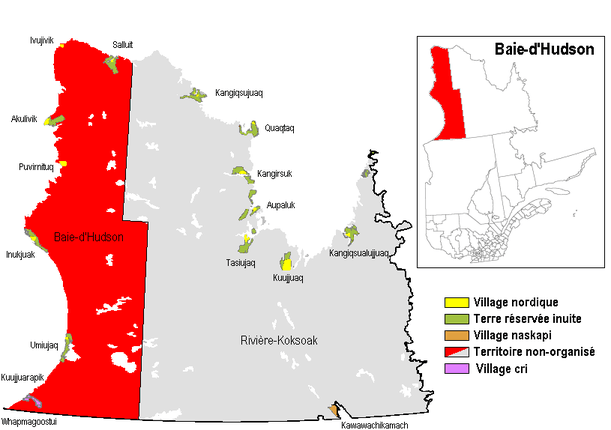Baie-d'Hudson, Quebec
From Wikipedia, the free encyclopedia
| Baie-d'Hudson | |
|---|---|
| Unorganized territory | |
 Baie-d'Hudson | |
| Coordinates: 58°30′N 75°00′W / 58.500°N 75.000°WCoordinates: 58°30′N 75°00′W / 58.500°N 75.000°W[1] | |
| Country |
|
| Province |
|
| Region | Nord-du-Québec |
| TE | Kativik |
| Constituted | unspecified |
| Government[2] | |
| • Federal riding | Abitibi—Baie-James—Nunavik—Eeyou |
| • Prov. riding | Ungava |
| Area[2][3] | |
| • Total | 156,370.40 km2 (60,374.95 sq mi) |
| • Land | 129,712.09 km2 (50,082.12 sq mi) |
| Population (2011)[3] | |
| • Total | 0 |
| • Density | 0.0/km2 (0/sq mi) |
| • Change (2006–11) |
|
| • Dwellings | 0 |
| Time zone | EST (UTC−5) |
| • Summer (DST) | EDT (UTC−4) |
Baie-d'Hudson is a very large unorganized territory in the Kativik Regional Government territory in the Nord-du-Québec region of Quebec. It is named after Hudson Bay.
It consists of nearly the entire western part of northernmost Quebec. Bordering it to the east is the other large unorganized territory in Kativik, Rivière-Koksoak.
Its population in the Canada 2011 Census was 0; enclaved within it, however, are various northern villages (i.e, Inuit communities), a Cree reserved land, and a Cree village municipality. In the 2006 census it had had a population of 16.

References
This article is issued from Wikipedia. The text is available under the Creative Commons Attribution/Share Alike; additional terms may apply for the media files.